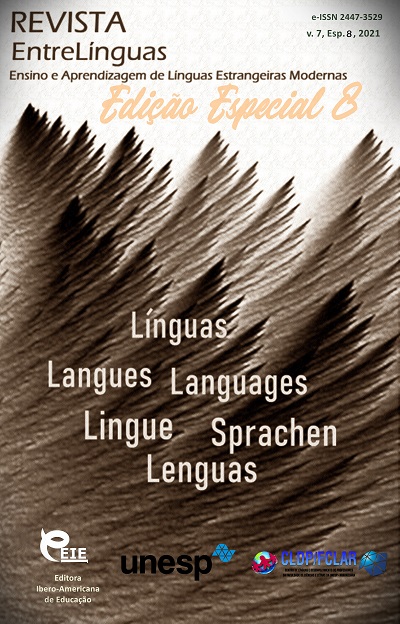Cognition and learning with a mother tongue approach
DOI:
https://doi.org/10.29051/el.v7iesp.8.16397Keywords:
Cognition, Learning, Mother-tongue, LanguageAbstract
The primary objective of the study is to inspect cognition and learning with a mother-tongue approach. A language is a tool rather than a plan that sometimes replaces education is a fundamental task. Four communities to the history of civilization are the history of native language content, age of housing, metal era, the era of science and technology, and is now divided into the information age. In all periods, the mother tongue has a crucial role and is fundamental for people. Mother tongue constantly evolves the character of people, and cognition is constructive. This research is based on a descriptive way and library. This study indicates that there is a language of communication in the process; and learning to express their environment and surroundings plays an essential role in its development.
Downloads
References
Antonyuk V.S., Danilova I.V., Mitelman S.A., Bulikeeva A.J. (2015) Management of social infrastructure of regions in the system of tools to improve the quality of life of the population in regions // Regional Economy. №3. P.53-66.
Dagbaeva, S.D.-N. (2019). TERRITORIAL PROBLEMS OF SOCIAL INFRASTRUCTURE DEVELOPMENT. Fundamental research. 38-42. 10.17513/fr.42435.
DeAngelis, Michael & Tomlinson, Richard. (2021). Municipal Infrastructure Investment Unit MidTerm Review.
Eireiner, A. (2021). Promises of Urbanism: New Songdo City and the Power of Infrastructure. Space and Culture. 120633122110387. 10.1177/12063312211038716.
Eremeeva, E.A. & Volkova, N.V. & Khalilova, T.V. (2019). Development of social infrastructure in the Russian regions. International Review. 113-119. 10.5937/intrev1903113E.
Felio, Guy. (2021). New developments for Canada's municipal infrastructure guide.
Frolova, E.V. (2014). Social infrastructure of contemporary Russian municipal bodies: Issues and prospects for modernization. Sot͡siologicheskie issledovanii͡a.
Huang, Weihe & Lu, Chunfang & Fang, Dongping. (2021). Special issue: City and infrastructure engineering and management. Frontiers of Engineering Management. 8. 10.1007/s42524-020-0150-0.
INFRAONE analytical review. Russia's Infrastructure Development Index 2019.
Ishmurzina, R. & Zakirov, I.. (2021). Development of social infrastructure in the cities of the Republic of Bashkortostan. Reports of Bashkir University. 79. 10.33184/dokbsu-2021.2.3.
Kalinnikova, Marina & Golovina, Anna. (2020). The City Social Infrastructure as a Reflection of Physical Space Quality. Izvestia of Saratov University. New Series. Series: Sociology. Politology. 20. 128-132. 10.18500/1818-9601-2020-20-2-128-132.
Kholopova, Y.S. (2010) Scientific approaches to the study of social infrastructure / Y.S. Kholopova // Youth and Science of the XXI Century. Ulyanovsk: UGCA, Vol. P. 163-166.
Lantsov A.E. (2013) Infrastructure: the concept, types and significance // Statistics and Economics. no. 3. P.49-51.
Layton, Jack & Latham, Alan. (2021). Social infrastructure and public life – notes on Finsbury Park, London. Urban Geography. 1-22. 10.1080/02723638.2021.1934631.
Medvedeva N.V. Business participation in social development of the territory: Limitations and potential opportunities. Voprosy Ekonomiki. 2018;(6):126-132. https://doi.org/10.32609/0042-8736-2018-6-126-132
Nalesnaya Y.A.(2006) Improving the management of social infrastructure of the city in conditions of reforming the system of local self-government // Proceedings of SFU. Technical Sciences. №17. P.131-133.
Popov, Evgeny & Katz, Irina & Veretennikova, Anna. (2015). Evaluating the Social Infrastructure of Municipalities. MONTENEGRIN JOURNAL OF ECONOMICS. 11. 31-48. 10.14254/1800-5845.2015/11-2/2.
Report of the Head of "Balabanovo Town" Administration on the results of socio-economic development in 2019.
Serohina-Berestovska, O.. (2018). Factors determining management practices of modernization of social infrastructure of municipalities. Science and Education a New Dimension. VI(31). 36-39. 10.31174/SEND-HS2018-185VI31-08.
Shahata, Khaled & El-Zahab, Samer & Zayed, Tarek & Alfalah, Ghasan. (2021). Client-driven performance-evaluation framework for municipal infrastructure. Structure and Infrastructure Engineering. 10.1080/15732479.2020.1867590.
Sycheva I.V., Sycheva N.A. (2012) Study of the content of the "Social infrastructure" category // Proceedings of Tula State University. Economic and legal sciences. №2-1.P.230-238.
Toshchenko J. T. (2001). Sociology. General Course. - 2-nd, supplemented and revised edition: Prometheus: Yurite, 511 p.
Vanier, Dana & Danylo, N. (2021). Municipal infrastructure investment planning: managing the data.
VCIOM. URL: https://wciom.ru/index.php?id=236&uid=3364 (accessed 30.06.2020).
Yarkova, Mikhailovna. (2020). Basic aspects of rural social infrastructure development. International Review. 98-104. 10.5937/intrev2003098Y.
Yashima, Atsushi & Huang, Yu. (2021). Social Infrastructure Maintenance Notebook. 10.1007/978-981-15-8828-0. 2021
Zhukova T.I. & Strashnova Yu.G. & Strashnova L.F. (2020). MONITORING DEVELOPMENT OF SOCIAL INFRASTRUCTURE IN TERRITORIAL MANAGEMENT. EurasianUnionScientists. 6. 12-16. 10.31618/ESU.2413-9335.2020.6.70.560.
Downloads
Published
How to Cite
Issue
Section
License

This work is licensed under a Creative Commons Attribution-NonCommercial-ShareAlike 4.0 International License.
Os manuscritos aceitos e publicados são de propriedade da Revista EntreLínguas. Os artigos publicados e as referências citadas na Revista EntreLínguas são de inteira responsabilidade de seus autores.
Transferência de direitos autorais – autorização para publicação
Caso o artigo submetido seja aprovado para publicação, já fica acordado que o(s) autor(es) autoriza(m) a UNESP a reproduzi-lo e publicá-lo na EntreLínguas, entendendo-se os termos “reprodução” e “publicação” conforme definição respectivamente dos incisos VI e I do artigo 5° da Lei 9610/98. O artigo poderá ser acessado pela rede mundial de computadores (Internet), sendo permitidas, a título gratuito, a consulta e a reprodução de exemplar do artigo para uso próprio de quem a consulta, desde que haja a citação ao texto consultado. Essa autorização de publicação 328 EntreLínguas, Araraquara, v. 1, n .2, p. 323-328, jul./dez. 2015 não tem limitação de tempo, ficando a UNESP responsável pela manutenção da identificação do(s) autor(es) do artigo. Os artigos publicados e as referências citadas na Revista EntreLínguas são de inteira responsabilidade de seus autores.











